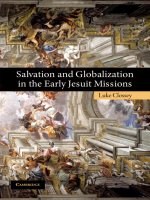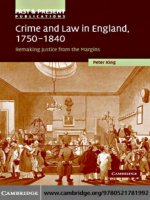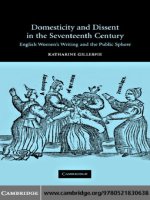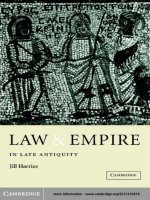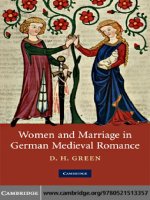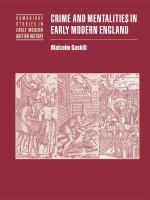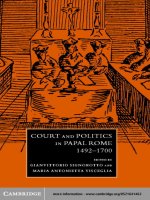0521870291 cambridge university press exile and journey in seventeenth century literature may 2007
Bạn đang xem bản rút gọn của tài liệu. Xem và tải ngay bản đầy đủ của tài liệu tại đây (888.88 KB, 209 trang )
This page intentionally left blank
EXILE AND JOURNEY IN
S E V E N T E E N T H - C E N T U RY L I T E R AT U R E
The political and religious upheavals of the seventeenth century
forced an unprecedented number of people to flee from England or
remain in internal exile. Among these exiles were some of the most
important authors in the Anglo-American canon. Christopher
D’Addario explores how early modern authors reacted to and wrote
about the experience of exile in relation both to their lost homeland
and to the new communities they created for themselves. He
analyzes the writings of first-generation New England Puritans, the
Royalists in France during the England Civil War, and the ‘‘interior
exiles’’ of John Milton and John Dryden. D’Addario explores the
nature of artistic creation from the religious and political margins of
early modern England, and in doing so, provides detailed insight
into the psychological and material pressures of displacement and a
much overdue study of the importance of exile to the development
of early modern literature.
christopher d’addario is visiting Assistant Professor of
English at Gettysburg College, Pennsylvania.
E X I L E A N D J O U R N EY I N
S EV E N T E E N T H - C E N T U RY
L I T E R AT U R E
CHRISTOPHER D’ADDARIO
CAMBRIDGE UNIVERSITY PRESS
Cambridge, New York, Melbourne, Madrid, Cape Town, Singapore, São Paulo
Cambridge University Press
The Edinburgh Building, Cambridge CB2 8RU, UK
Published in the United States of America by Cambridge University Press, New York
www.cambridge.org
Information on this title: www.cambridge.org/9780521870290
© Christopher D’Addario 2007
This publication is in copyright. Subject to statutory exception and to the provision of
relevant collective licensing agreements, no reproduction of any part may take place
without the written permission of Cambridge University Press.
First published in print format 2007
eBook (EBL)
ISBN-13 978-0-511-28468-7
ISBN-10 0-511-28468-3
eBook (EBL)
hardback
ISBN-13 978-0-521-87029-0
hardback
ISBN-10 0-521-87029-1
Cambridge University Press has no responsibility for the persistence or accuracy of urls
for external or third-party internet websites referred to in this publication, and does not
guarantee that any content on such websites is, or will remain, accurate or appropriate.
Contents
Acknowledgments
page vii
Introduction: The ‘‘remanence’’ of the past: the early
modern text in exile
1
1 Nostalgia and nationalism in New England literature
22
2 Exile and the semantic education of
Thomas Hobbes’s Leviathan
57
3 The expulsion from Paradise: Milton, epic and the
restoration exiles
87
4 Sybil’s leaves: Dryden and the historiography of exile
Epilogue
124
149
Notes
Index
152
195
v
Acknowledgments
Appropriately in writing about journeys and exile, I have myself moved
far and often during the several years it took to research and write this
study, living in five different cities since the project’s inception. I have had
the aid of numerous hands and minds amidst these travels. First and
foremost, I would like to thank Steven Zwicker for his unflagging support, considerate attention and invaluable advice and insight, without
which this study would never have been completed. I would also like to
thank Derek Hirst and Joseph Loewenstein for their thoughtful suggestions and advice as they read various chapters through the composition
stages. Dan Shea and William Spengemann were kind enough to add
their insight to my work on the New England Puritans. I have presented
much of this work to the early modern reading group at Washington
University – to its members, particularly Matthew Harkins, Sam
Thomas, Gavin Foster and Felicia Else, many thanks for your perceptive
and helpful comments.
This project was supported by two fellowships – from the William
Andrews Clark Memorial Library (through the generosity of Penny
Kanner) and from the John Carter Brown Library. In the early stages of
the research, I received invaluable assistance from the staffs at these
two libraries: Bruce Whiteman and Jennifer Schaffner at the Clark and
Norman Fiering at the JCB. Washington University and the Mellon
Foundation also provided generous support at various points.
An abridged and earlier version of Chapter 4 appeared as ‘‘Dryden and
the Historiography of Exile: Milton and Virgil in Dryden’s Late Period,’’
in The Huntington Library Quarterly 67, no. 4 (2004), 553–72 and is reused
with permission.
To my friends and companions in my travels over the past few years,
your company has reminded me of the importance and joy that we can
derive from conversation and conviviality, no matter the silliness of the
dialogue (or the speaker). A special thanks as well to Peter and Tiffany
vii
viii
acknowledgments
D’Addario for their hospitality as I completed this project. Finally, my
thanks to my closest companion, Kathy, whose love and patience, as well
as her willingness to get on an airplane, has enabled me to see the work to
completion. May we continue our travels wherever they may take us.
introduction
The ‘‘remanence’’ of the past:
the early modern text in exile
After a lifetime of wars and conflicts the sixteenth-century Italian writer
Matteo Bandello reflected on the disturbances of his native land from
exile in Agen, France. Bandello, monk, diplomat, soldier and author,
ruminated that, with all of the displaced Italians now living far from
their patria, an entire city of exiles could be founded and populated.1
However, the aging monk does not dwell long on this imagined city,
rather letting it fade from the page and from memory. The ephemeral
appearance of this city is typical of the imagined geographies of exile,
geographies that emerge more often as figments of space and time rather
than as realistic, concrete memories. This is not to say that memories do
not drive the exile’s imaginings; indeed, it is the rupture of departure, and
the lingering shadow of the homeland left behind, that gives rise to
Bandello’s imagined city.2 Yet Bandello, who left Florence when the
Spanish invaded in 1522, does not envision or reconstruct his lost patria
in the text, but rather imagines a city characterized primarily by the
collective experience of exile, its inhabitants not reminiscing about the
lost quotidian particulars of Florentine life, but rather about their various
stories of displacement. Almost five hundred years later, Russian exiles in
New York City would similarly recreate stories about their exiles as they
collected ‘‘diasporic souvenirs’’ that displayed their wanderings while
admitting a multiple, transient belonging that lay somewhere between
New York City and St. Petersburg.3 Outside of London, Polish exiles
from World War II remained in refugee camps until late into the 1950s,
seemingly afraid to forget their displacement, as if this forgetting might
mean that they could never go back.
For these exiles, as well as for Bandello, the present is marked
by a provisionality necessarily veiled by the rupture of exile, their recreations and memories necessarily piecemeal and complexly layered by the
transitory experience of displacement. As they walk in the present, these
exiles see, hear and smell both the immediacy of their newly foreign
1
2
exile and journey in 17th century literature
existence and the silhouette of the day before their exile. As the Egyptian
e´migre´ Andre´ Aciman admits, his New York is the ‘‘shadow of the shadow
of Alexandria, versions of Alexandria, the remanence of Alexandria.’’4 It is
this layering of here and there, as well as the sense of provisionality, that
often drives the various creations of exiles. The desire to create in exile
comes from both the necessity of reorienting oneself somewhere between
the lost past and the immediate present, and the need to fashion a peaceful space in which the author can operate away from the unsettled, difficult reality of daily life. Bandello’s city of exiles exists only in his
imagination, free to be built and peopled however he likes. In many
ways, the exilic creation seeks to counter, although never completely successfully, the repeated impressions of provisionality that displacement
leaves upon the exile. The Russian exiled poet Joseph Brodsky acknowledges this when admitting that the writer always ‘‘knows how willful, how
intended and premeditated everything he has manufactured is. How, in
the end, all of it is provisional.’’5 While the ability to recognize the
provisionality that Brodsky elucidates drives the various grand literary
constructions of exile, it also adds a poignancy and doubt that serves as
a counterpoint to the willfulness of the exilic creation.
The events of the sixteenth and seventeenth centuries in England cast
many of Aciman’s shadows, shadows of old Englands, across the minds
of its exiles. Indeed, by the last decade of the seventeenth century, these
Englands lingered in the memories of men and women as various as the
second generation New England governor in Boston, John Winthrop, Jr.,
the converted Catholic at the Jacobite court in St. Germain, Jane Barker,
and the exiled and unrepentant regicide in Vevey, Switzerland, Edmund
Ludlow. Throughout the century, men and women were forced to recognize that the old England that they had known and to which they had
attached themselves was now merely a shadow of a memory that had been
indelibly marked by one form of departure or another. So, the memories
of George Goring’s life of military honor before 1640, tainted by defeat
and exile at the hands of the New Model Army, seem to have chased him
across the Continent as he eventually drank himself to death, in what the
fellow exile Ann Fanshawe would later call a ‘‘debauchery beyond all
precedents.’’6 So, the memories of the high republican rhetoric of the
Parliament of 1650 lingered in the ears of John Milton as the poet was
inundated in 1660 with the ringing shouts for the return of the Stuarts
and the burning of Milton’s The Tenure of Kings and Magistrates. The
‘‘confusions and revolutions’’ of governments occurred with such frequency, and enacted such wholesale change, that most exiles, excepting
The ‘‘remanence’’ of the past: the early modern text in exile
3
the Jacobites at the end of the century, had the opportunity to return to
their homeland. Many other prominent exiles, including Edward Hyde,
Henry Vane, Algernon Sidney, Edmund Ludlow, and James II and his
most loyal Stuart retainers, fled into exile more than once or else returned
only to be imprisoned or executed at a later date. For all of these exiles, the
disjunctions between ‘‘here’’ and ‘‘there’’ remained constant during their
displacements, reinforcing the arbitrariness of their own existence and
identities.7
We are just beginning to comprehend the psychological, communal
and literary terrain of the experience of displacement, mainly because
voices from exile are finally being heard and listened to. We only know
the story of the first exile, the ancient Egyptian Sinuhe, because he
returned to his homeland to communicate his story.8 In the twentieth
century, displacement and exile has become the common fate of groups
and individuals too numerous to mention as the ravages of totalitarianism, genocidal ideology, fundamentalism and nationalism have bereft
scores of communities of their homes and homelands. Because of the
frequency of displacements in the past eighty years, and because of the
prominence of the political and literary endeavors of some of these exiles,
we have grown increasingly attuned to the experiences and literatures of
dispersed communities. Yet we have yet to apply this increased knowledge
of and sensitivity to the ruptures of exile to the early modern period,
where, particularly in seventeenth-century England, an unprecedented
number of men and women were forced to flee England or to remain
in an ‘‘internal exile,’’ unreconciled to the ruling authority. The broadness
of the phenomenon of exile in early modern England has largely gone
unrecognized beyond a passing mention in studies that concentrate on
one specific community. Yet the conflicting judgments of the 1630s,
1648–9, 1660 and 1688 of what and who ‘‘England’’ and its government
represented (and we might also add the judgments of 1641–2, 1653, 1667,
and 1680–2) ensured that widely divergent groups were forced from their
homes and former ways of life. This study seeks to redress the neglect of
the formative psychological, social, affective and literary experience of
exile in the lives of these divergent groups. Further, it seeks to outline,
at least provisionally, the importance of exile to our understanding of
prominent literary, religious and philosophical texts, indeed some of the
foundational elements of the early modern canon. In undertaking this
study, I wish to emphasize that the experience of exile, of being removed
to the margins of the English-speaking world, either geographically, politically or religiously, inflected and influenced in specific ways a series of
4
exile and journey in 17th century literature
English literary traditions and forms, from lyric poetry to political philosophy, from epic to translation.
My move from the experience of exile to the text written in or imagined
under the pressures of exile in the previous paragraph should not go
unremarked. The studies that follow both examine the experience of
exile by reading imaginative texts, and interpret imaginative texts as,
crucially, written from one form of exile or another. My approach assumes
a particular conception of the written text, one that foregrounds it as a
social and cultural phenomenon embedded in the circumstances of its
production and consumption, and relatedly as an object that can provide
us with a particular knowledge of these circumstances. That is, the written
text should be seen both as a social process, an object within the material
exchanges of everyday life, and as an immediate and important insight
into and formative agent for the social or cultural moment with which it
is concerned.9 I thus view the texts that I examine in the following
chapters as both determiners of social and cultural exchange, and also
as scripts arising out of the particular effects of banishment from one’s
home or former way of life. Not only did the text written from a real or
imagined exile register the distinct sense of loss, the profound uprootedness, and the novel set of social and political circumstances that attended
the author’s exile; it also importantly negotiated and attempted to configure these consequences for both the author and his or her audience.
Studying what are social, affective, political and religious experiences
through the written word, as I do in the following chapters, draws attention to the centrality of language to the perception of displacement by the
exile. Language, crucially, remained the exile’s most immediate link to
a lost homeland or life that he or she had previously known, the most
insistent reminder of the exile’s banishment or marginalization. A twentieth-century German exile once expressed the attenuated relationship
that the exile maintains with his or her homeland’s language: ‘‘German,
for me, has become a foreign language to which I know all the words.’’10
Early modern writers, and we could assume, audiences, also seemed to
have been fully aware of the deep effects exile had upon the exiled
community’s language, as well as the English language’s importance to
their identity. In Richard II for example, upon learning of his banishment
from the realm, Thomas Mowbray largely understands his misfortune in
terms of the loss of his mother tongue:
The language I have learn’d these forty years,
My native English, now I must forego:
The ‘‘remanence’’ of the past: the early modern text in exile
5
And now my tongue’s use is to me no more
Than an unstringed viol or a harp,
Or like a cunning instrument cased up,
Or, being open, put into his hands
That knows no touch to tune the harmony
.....................................
What is thy sentence then but speechless death,
Which robs my tongue from breathing native breath? (I.3.160–66, 172–3)11
Mowbray’s lament figures the lost homeland as the loss of his ability
to breathe or speak with his native tongue, the silencing of spoken interactions in English standing in for his exile generally. Displacement
removes the exile indelibly from the living stream of the English language.
The English exiles that fled to the Continent were forced to recognize the
contingencies of expression as they were removed from the language that
they had learned as children, and thus had unconsciously associated with
direct reality. It is not without reason that the fall and subsequent banishment of Adam and Eve has also been told as a tale of the fall into
human language. The ‘‘fruit of that forbidden tree’’ necessarily entailed
the transformation of words from mimetic sacrality to corrupt allegory.
Their exile ensured the disjunction between the world as is and the world
as represented, a problem of which Milton was all too aware, even as he
grappled with the story of that first fall into allegory. The editors of the
Geneva Bible similarly immersed themselves in the comforts and difficulties of their English translation as they lived in a Swiss canton, far from
the interchanges of a Marian England that itself often spoke a language at
odds with their own. A constant awareness of the contingency of language
would have reminded the exiles at all turns of their banishment or
marginalization as they fulfilled their quotidian tasks, and as importantly,
those in authority conversed in a language in many ways foreign to them.
As much as the nobility and gentry exiled might have been conversant in
French or Dutch, those who were banished consistently registered the loss
of their native tongue. Ralph Verney, in exile with the Stuarts in the 1640s
and ’50s, admitted in a letter to his friend back in England that, while he
knew French well enough to translate two anti-papist books into French,
he still could not speak it easily and relied on servants and others to help
him with spoken exchanges.12 Edmund Ludlow, in the Swiss town of
Vevay after the restoration, was thankful that he lodged with a merchant
whose wife was English, since they spoke the same language; when he
lodged at Dieppe he could only converse with a French doctor in broken
Latin.13
6
exile and journey in 17th century literature
Beyond the inconvenience that the language barrier posed for English
exiles, it also foregrounded a more metaphysical separation from the
living exchange of their mother tongue as well as more generally from
the past homeland they had known. In the final two lines from
Mowbray’s lament above, Mowbray conflates the loss of language with
a more metaphysical separation from breathing English air. Language,
even at this early stage in the formation of a standardized idiom, was a
carrier for English traditions and cultural identity, as the phrase ‘‘mother
tongue’’ suggests. The upheavals and exiles that ruptured the English
nation throughout the early modern period came at a time when growing
print production and the move to a vernacular administrative language
drove the standardization of English, particularly in and around London,
where the print market and political authority lay.14 But, without placing
these exiles in a specific narrative concerning the spread of a uniform
language throughout the country, we can recognize that the English language was the medium through which the displacements of exile, however
variously defined, were most acutely felt. For Ralph Verney, unfamiliarity
with the French language shades over into a distaste for French custom
and a yearning for English schooling for his children. Similarly, Ludlow’s
relief at housing with an Englishwoman with whom he can converse
comes alongside a relief over their possession of English beer, rather
than the French wine which had so damaged his health.15 More basically,
the removal from the circulation of written materials in and around the
print community of London drove the exiles’ constant desire for more
news from their departed homeland and exacerbated the perception of
their displacement from the immediate events of the English nation as
well as the living interaction of the English print community.16
For interior exiles, such as the defeated republicans who remained in
England during the restoration, the experience of immediate removal
from the quotidian use of the English language obviously did not
occur. Indeed, prominent interior exiles such as John Milton and John
Dryden continued to read avidly and were acutely aware of the specific
movements of the learned London reading community. However, for
these interior exiles the language that they used necessarily remained
politically or religiously distant from the discourses of those reconciled
to the present authority or even those tacitly accepting of the status quo.
Charles Simic, in describing the Romanian exile Norman Manea’s
increasing alienation under Ion Antonescu’s regime, notes that Manea
came to find an ‘‘unbridgeable gulf between the language he used in
public with its canonic certainties and the words he kept to himself.’’17
The ‘‘remanence’’ of the past: the early modern text in exile
7
In the case of those forced into an interior exile by the events of 1659–60
or 1688, the unbridgeable gulf between a language of private thought and
public expression would not have opened gradually but widened quickly
as they and their compatriots were removed from power and from a
public voice. As these men and women sequestered themselves from the
active life governed by the present ‘‘social contract,’’ and ventured less and
less into public spaces to exchange goods and ideas, they also increasingly
and consistently recognized the distance at which their language lived
from the dominant and accepted modes of discourse.18 Milton, blind,
briefly imprisoned and otherwise sequestered, would have heard keenly
the drunken shouts for Charles Stuart around the bonfires that burned
calves’ rumps in effigy of the Rump Parliament, as well as the reports of
attacks on Puritan ministers, the burning of the Commonwealth’s arms
and the extravagant pageantry of the king’s return. A year later, from his
house on Jewin Street, Milton would have heard the processions of the
hanging carts as the authorities dragged the exhumed bodies of Oliver
Cromwell, Henry Ireton and John Bradshaw to the Red Lion Inn and the
gallows at Tyburn, around the corner from Milton’s residence. Perhaps
remembering the vocal support for Richard Cromwell and even the
Rump mere months ago, Edmund Ludlow recalled that the ‘‘flattering
of Charles Steward . . . made my eares tingle, and my heart to ake, all
thinges running counter to what the providencyes of the Lord had lead to
for twenty yeares past.’’19 Part of the engaged desperation that can be felt
in Milton’s The Readie and Easie Way should be understood as the desperation of an author grasping at, or holding on to, a language of republican, reasoned citizenship that he knew no longer appealed to or held
much authority for his audience (if he still had one).
In light of the events that occurred later in 1660, the second edition of
The Readie and Easie Way has been seen as the last, desperate plea of the
fading hopes of the Good Old Cause on the eve of the restoration. Much
of what has puzzled or disturbed critics in Milton’s last major publication
before Paradise Lost is its ability to reconcile a jeremiadic, rigorous independence from common conceptions and opinions with a firm belief in
the reasonableness of its proposals, with which everyone should and, to a
certain extent, must agree. However, we might see this rhetorical disjunction as an admission on Milton’s part of the duplicity of the English
language as it turned at the moment of the restoration. In this case, his
adherence to a reasoned rhetorical stance at a time when few reasoned in
the same way becomes a studied resistance, an assertion of one ‘‘way’’ of
meaning when the language of obedience, of deliverance and of
8
exile and journey in 17th century literature
providence was being yoked to the fortunes of the soon-to-be Charles II.
As Michael Seidel has noted, writing from exile generally necessitates a
‘‘willful act of the imagination to comprehend and register the experience
of exile and the lost homeland.’’20 In Milton’s case, and in the case of the
other exiles I study here, this ‘‘willful act of the imagination’’ often takes
the form of an adherence to idiosyncratic, nostalgic modes of speaking as
the discourses of authority change around them. One of the clearest ways
in which we can see the ‘‘willfulness, exaggeration and overstatement’’ to
which exiles are prone is through their consistently peculiar, yet normative, use of the English language.21
When Hobbes vigorously asserted his own refiguring of the body politic and of political language as normative, or when Dryden constructed a
model of the icon of imperial poetry, Virgil, for his own purposes, these
writers were answering to, and importantly, constructing, the experience
of exile. Further, through their presentation of idiosyncrasy – such as in
Hobbes’s normative rhetoric or Nathaniel Ward’s overdetermined
Marprelatian neologisms in The Simple Cobler of Aggawam – these
exiles both insist on their remoteness and distinctness while asserting
this remoteness as ‘‘true Englishness.’’ As Edward Said has argued, writing
from exile often recreates the peripheral as the central as it challenges
consensus.22 Perhaps Shakespeare was reminded of the insistent nationalism of the Marian exiles who had returned from the Continent as he
imagined Coriolanus denouncing the plebeians for banishing Rome’s true
defender and reversing the terms of his own exile:
You common cry of curs, whose breath I hate
As reek o’ the rotten fens, whose loves I prize
As the dead carcasses of unburied men
That do corrupt my air, I banish you! (3.3.120–23)23
By refiguring their own marginalization and exile as central, and truly
English, exiles react to and seek to comprehend the experience of displacement, the physical, ideological or affective removal from their homeland. Exile is a profoundly disruptive and traumatic experience, one that
entails both a sharp break in the quotidian existence of one’s life and a
removal from that which is most familiar and comforting; it ‘‘involves
dislocation, disorientation, self-division.’’24 As the exile is removed from
familiar material, structural and familial surroundings, his or her sense of
a coherent identity and continuous history is ruptured. The writing that
arises out of this experience, writing such as Leviathan or Paradise Lost,
seeks to heal, reconsider, or even elide these ruptures through the
The ‘‘remanence’’ of the past: the early modern text in exile
9
imaginative control of the author both over substance and, more specifically, over language. Drawing on the reflections of Walter Benjamin,
Seidel calls exilic creation a ‘‘fragile, precious reality of a place where
the imagination is sovereign.’’25 The self-conscious assuredness of these
texts provides a comfortable space within and from which these authors
speak.
However, the very self-consciousness of Milton’s poetic voice, or, to
take another example, of Bradstreet’s humble yet confident muse, must
not be ignored. The ruptures of exile, the pressures placed on the material
and affective lives of these writers through their removal from the familiar, are never fully dispelled by the act of writing; the elision of exile is
never fully successful. In fact, we might cite the numerous, and frequent,
failed or unfinished creative attempts of early modern English exiles,
from the incomplete royalist epics of William Davenant and Abraham
Cowley to the unfinished memoirs of the regicide Edmund Ludlow, as
evidence of the difficulties, both practical and imaginative, of writing
from exile. Even in the grand, created worlds of the early modern
exiles examined here, the authors evince a consistent anxiety over the
assertiveness of their presence, over the ‘‘willful acts’’ that underwrite
their creations. Thus, while Hobbes’s authoritarian political philosophy
is predicated upon a normative semantics of which Hobbes arrogates
control to himself, he also outlines the shaky epistemological basis for
all language in his opening chapters. In fact, it is precisely because of his
understanding of all language as relative that Hobbes asserts the need for
sovereign – and, within Leviathan, authorial – control of how words
mean. Nervousness over the fixity of language, over its ability to represent
accurately, runs through all of the works examined here, and runs parallel
to a concomitant desire to assert the author’s own, often notably distinct,
language as ideal. For many exiles the performative, be it the public
gesture, the fashionable garment and posture, or the published written
text, becomes an essential method through which identity is created and
the disruptions of exile are overridden.26 As much as early modern
English men and women were attuned to the constructedness of all
selves, to the extent to which identity was based on performance, we
might see in the early modern literature of exile a stark acceptance and
enactment of this fashioning of the self. The written text serves as the site
for much of this exilic self-fashioning, both because of the availability of
writing as an expressive and public form to the literate exile, and because
language, even in the early modern period, was a critical carrier of
culture.
10
exile and journey in 17th century literature
For seventeenth-century English exiles, the nervousness over semantics
and the bold assertion of their own constructed language often came
together as they reacted to and attempted to order the experience of
exile. Their often idiosyncratic use of the English language arises out
of the sudden movement of definitions after each major shift in government, after ‘‘loyalty,’’ ‘‘obedience’’ and ‘‘honor’’ leave their possession.
The assertion of their own way of meaning often seeks nostalgically to
reorient these terms and the English language generally to older, yet now
radical, definitions. Similarly, just as the exiled author reaches backward,
or perhaps forward, for a language that registers uprooting and loss of an
old way of speaking or writing, this author also looks backward as he or
she seeks to reconstruct a history and past that comprehends their new
status as exiles. Nostalgia, a longing for a return to home, to a return to
the way things were, suffuses much exilic writing, from Ovid’s Tristeia to
Milton’s Paradise Lost, to the poetry of Joseph Brodsky. In her recent
exploration of twentieth-century exile and longing, The Future of
Nostalgia, Svetlana Boym notes that nostalgia, as ‘‘a historical emotion,
is a longing for that shrinking ‘space of experience’ that no longer fits the
new horizon of expectations.’’27 Although Boym places the origins of
‘‘nostalgic longing’’ firmly in the development of modern notions of
teleological history and thus after early modern exiles, we can still understand the nostalgic desires of early modern exiles in much the same terms.
After all, while a modern history of progress was yet infrequently formulated beyond perhaps Baconian empiricism, notions of providential intervention and protestant reformation, in which the current ruling powers
fulfilled God’s will in England, identified the defeated parties of 1648–9,
1660 and 1688 as the irreligious opponents to the progress of God’s
people on earth. As the political tides shifted with war, restoration and
revolution, so English history became a contested ground upon which
ideological battles were fought. The politics, religion – and narratives – of
those in exile were sloughed off as a corruption of God’s will and true
Englishness. Nostalgia was an expression of a continued attachment to
a world, and a way of life, now lost and publicly decried and derided.
At the same time, the exiles’ turn to history enabled them to control
its very terms within their created worlds, thus justifying and ordering the
experience of exile both to themselves and to their audience. The turn to
history and the past that is so prevalent in all the writers I explore here
bridged the gap between a lost homeland, be it geographic or imagined,
and the upheavals of exile by denying the gap’s historical existence. And,
while the nostalgic turn to the past answered to and reflected the insistent
The ‘‘remanence’’ of the past: the early modern text in exile
11
memory of a lost world so indelibly part of the experience of exile, it also
served a polemical or public purpose, constructing a history that refigures
the exiles as central, as the saving remnants of an English nation hopelessly astray.
Ã
Ã
Ã
This last point, that these texts of exile often anticipated and wrote for
a specific public moment, deserves particular emphasis. Diaspora is a
term that has increasingly been used to describe specific forms of displacement and community, most often in a postcolonial context. The
term, while maintaining its spiritual resonance in its broadly positive
assumption of resilience and preservation in the face of loss and migration, has come to identify hybridity, reciprocity and exchange as the
markers of the postcolonial, diasporic community. For example, in The
Black Atlantic, Paul Gilroy discusses the postmodern African diaspora
and the dislocations that engendered it by approaching the culture of
the Black Atlantic, a culture of creolization and syncretism, from ‘‘an
explicitly transnational and intercultural perspective,’’ while strongly
critiquing the nationalist and ‘‘ethnically absolute paradigms’’ of previous
approaches.28 Similarly, Homi Bhabha, the critic perhaps most responsible for theorizing notions of hybridity in the postcolonial context, argues
that in studying the displaced, exiled and marginalized we must begin
‘‘focusing on those interstitial moments or processes that are produced in
the articulation of ‘differences.’ . . . It is at the level of the interstices that
the intersubjective and collective experiences of nationness, community
interest, or cultural value are negotiated.’’29 It is this notion of the
‘‘articulation of ‘differences’ ’’ that can usefully be deployed in the examination of early modern texts written from exile. Without eliding or
downplaying the specific difficulties and freedoms that the displacements
engendered by colonization have entailed, we can also understand the
texts I examine here, texts written from various forms of exile in the early
modern period, as necessarily articulating specific differences with the
discourses of authority in and around the print metropolis of London,
and from a marginal position. Throughout this study, I have remained
particularly attuned to the distances that these exiled texts crossed as
they enter back into the London print market, as all of them necessarily
did. In The Black Atlantic, Gilroy uses the image of ships in motion as his
organizing principle, an image that articulately envisions the material
connectedness of the diaspora.30 Much like Gilroy, I wish to foreground
the material connectedness of early modern exiles, from those on the
12
exile and journey in 17th century literature
shores of New England, to Milton and Dryden living on the outskirts of
London, and particularly to foreground their continued reliance upon
and engagement with the English language print market and its production center in London. Because of the unique monopoly and Royal
charter that the Stationers’ Company had on print production in
England, the overwhelming majority of books printed in English were
produced in and around London.31 When the exiles that I study here
wrote for an English reading public, they wrote with an understanding of
the diverse and geographically or ideologically distant print market into
which their text would be disseminated.
My analysis of these texts from exile thus understands them as events
that cross geographic, linguistic and ideological boundaries, especially as
they pass back for entry into the London print market. As such events,
these texts had to negotiate, from a marginal position, broad religious or
political distances, as well as a distance from the discourses of authority
and dominant modes of expression in and around the London print
world.32 Important to my approach to these texts as events is the historical
reality that during the seventeenth century, and particularly after the
collapse of the licensing act in 1642, England experienced an unprecedented boom in print production and a sharp increase in public interest in
current affairs. As recent revisions to Ju¨rgen Habermas’s The Structural
Transformation of the Public Sphere have taken the pains to show, a confluence of conditions – parliamentary and religious upheaval, the outbreak of war, the lapse in licensing, and an opportunistic, materially
prepared print industry – led in the 1640s to a quickening print market
and rapidly growing readership in contemporary pamphlets and printed
materials.33
The exiles detailed in the following chapters sorely felt their separation
from the living interchange of this burgeoning print market as they
remained removed geographically, or, in the case of interior and geographic exiles, removed from claiming an authoritative public voice in
this interchange. Yet this separation, certainly intensified by the quickening print market, did not necessarily effect a turn inward, nor did it effect
writing that directed itself to an isolated audience of exiled readers or even
writing that desired no audience. Indeed, the writers who were successful,
who were able to fashion great imaginative works out of the fragments of
exile, tended to write with an eye towards not only the exiled world they
currently lived in but also the homeland with which they remained
engaged and by which they remained haunted. Much of the rhetorical
force, the linguistic anxieties and the imaginative innovations found in the
The ‘‘remanence’’ of the past: the early modern text in exile
13
texts that follow come from the exiled author’s anticipation of and worries
over his or her text’s release, from a marginal position, into the wideranging sympathies of a growing London readership. Whereas the literature of exile has often, and in the early modern period as well, been read
as reflecting the dislocation of exile, or perhaps more sophisticatedly, as an
allegory of the exile experience, my analyses attempt to delineate the
figurations that arise out of the text’s movement from exile back to the
homeland. It is in anticipation of this crossing that we can most clearly see
each of these authors constructing a rhetoric or poetics of exile and distance, an imaginative ‘‘articulation of difference’’ that answers to the
disruptions of exile.34
In many ways then, my work here has in mind the call of Maureen
Quilligan, Margreta de Grazia and Peter Stallybrass to include consideration of the material, of the ‘‘object,’’ into our critical discussions about
subjectivity and identity formation in the early modern period.35 As they
state in their prefatory remarks to the essay collection Subject and Object
in Renaissance Culture: ‘‘If the subject (or author or painter) is no longer
assumed to be prior to and independent of objects, criticism can attend to
a dialectic in which subjects and objects reciprocally take and make each
other over.’’36 Rather than considering the creative act as taking place
solely within the psychological and affective worlds of the individual
exile, my approach comprehends the literature of exile as intricately
related to the continued material connectedness with, yet distance
from, the lost homeland that lingers in the exiles’ memories and lives
on through the familiar objects that made up their everyday lives. Early
modern exiles necessarily lived without many of the material objects that
had previously surrounded them and had provided a sense of continuity
and familiarity, a sense of identity for them. For the ‘‘interior exiles’’
Milton and Dryden, the familiar rhythms and material interactions of
their lives before 1660 and 1688 respectively were irretrievably ruptured.
As a result of these material conditions, particularly of the material specifics of the English book trade circa 1650–1700, the text in exile exhibits
particular strategies that construct and order the dislocations that exile
engendered as it crosses back and enters the bookstalls of St. Paul’s
Churchyard or the stocks of a London bookseller. Once we include the
movement and interchange of objects into our account of early modern
exile literature, we can begin to move away from, first of all, a limited
conception of this complex phenomenon that centers on the individual
or the exiled community in isolation; and, second of all, any misconceived assumption that the exile wrote solely, or even primarily, for
14
exile and journey in 17th century literature
a ‘‘like-minded community of readers’’ that is coterminous with those
in exile.37
In concentrating on the exiled text as an event that crosses boundaries
as it passes into the hands of a broader readership, I take up two distinct
arguments in the two halves of the book with current critical consensus on
the writings of these various groups. The first argument pertains to most
of the analytical approaches to the geographic exiles I explore in the first
two chapters, the New England Puritans and the royalist exiles on the
continent. The criticism that has accrued around these two communities
of exiles obviously has often widely divergent concerns, encouraged by the
clear disciplinary divide coexistent with the great geographic and ideological distance that separated the New England Puritans from the royalists. Yet the two critical traditions work off similar assumptions: that the
literatures produced by these groups should be read and contextualized as
appealing to a like-minded community of readers, coterminous with the
exiled community. As such, the texts produced by John Cotton, Anne
Bradstreet, Thomas Hobbes and William Davenant have largely been
understood as arising out of and directing themselves towards a limited
range of ideological, political or affective concerns that can be broadly
labeled respectively ‘‘New England Puritan/American’’ and ‘‘royalist.’’
Let me be more specific in terms of each set of exiles and the respective
critical traditions that have grown around them. The study of early
American literature, understandably and usefully, has primarily focused
on the work of the New England Puritans as the first stirrings of an
American literary tradition that extends downward through Jonathan
Edwards and Emerson to the full flowering of the American
Renaissance in Melville and Hawthorne. Thus, Perry Miller and Sacvan
Bercovitch, the two most influential twentieth-century writers on early
American literature, both explore the writings of the first settlers of
New England with an eye toward identifying what made these works
particularly ‘‘American.’’38 While taking a transatlantic perspective in
his The Puritan Origins of the American Self, Bercovitch does so in
order to outline clearly the ‘‘unique qualities of the colonial outlook’’
and thus identify the origins of an American rhetoric of identity.39 More
recently, Andrew Delbanco and others have expanded Bercovitch’s narrative, attempting to explain the ideology and experience of ‘‘becoming
American.’’40 While all of these studies, and Bercovitch’s in particular,
have invaluably increased our knowledge of early Puritan rhetorical forms
and ideology, they also have tended to reinforce the nationalistic disciplinary boundaries institutionally established and physically embodied in
The ‘‘remanence’’ of the past: the early modern text in exile
15
the anthologies of ‘‘American’’ literature that begin with Marco Polo,
Christopher Columbus or Captain John Smith.
Without derogating the important search for origins that these
early Americanists have taken on, my work on the first generation
of New England writers concentrates on their productions as exilic
‘‘events’’ with their own conditions of production and consumption.
Importantly, these were texts that were printed and read in and around
the print metropolis of London, and thus they should be read in the
context of their long journey from the shores of New England to the
bookstalls of St. Paul’s Churchyard and the diverse readers of the entire
English print community. In my first chapter, I approach the printed
works of Nathaniel Ward and Anne Bradstreet, not to ascertain the specific ‘‘American’’ qualities of their work – the ways in which they prefigure later developments – but rather to delineate the construction of a
rhetoric and poetics of distance that arises out of and constructs their
English migration to the far shores of the Atlantic. Thus, part of the
argument of the chapter emphasizes the importance of moving away
from a conception of these texts as ‘‘American,’’ a conception, it should
be said, that has left Bradstreet and Ward’s texts in particular with some
odd bedfellows. By conceiving of Bradstreet’s The Tenth Muse and Ward’s
The Simple Cobler of Aggawam as transatlantic texts written and imagined
for a distant audience, I take up the criticism of a strain of Americanists,
in particular William Spengemann and, more recently and trenchantly,
Paul Giles, who have questioned the accuracy and efficacy of the use of
the adjective ‘‘American’’ for the writings of the first generations of
New England Puritans.41 Drawing upon Re´ne´ Wellek’s attack on the
narrow nationalism of much literary scholarship, Giles argues that the
categories ‘‘American’’ and ‘‘British’’ literatures ‘‘were much more divided
and unstable,’’ and that these nationalisms must be ‘‘seen as developing as
heretical alternatives to one another.’’42 Giles’s approach rightfully views
the early productions of the New England Puritans in a transatlantic
context that does not single out the American qualities of these texts
against a whitewashed background of vaguely British influence. While
my concern does not tend towards the emerging and interdependent
nationalisms of both sides of the Atlantic, I do read these texts, much
like Giles, as necessarily conceived and consumed in light of the complex
rhetorical position in which the New England settlers found themselves as
they wrote.
Just as much criticism on ‘‘Early American’’ literature has sought to
delineate an American context and, by implicit extension, audience for


